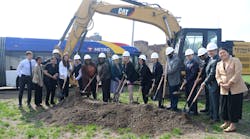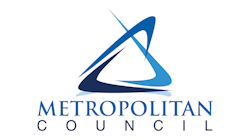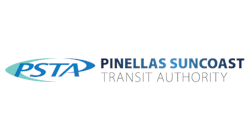The Pinellas Suncoast Transit Authority (PSTA) and Metro Transit in Minneapolis are making improvements to their service networks.
PSTA Board approves Connected Community Bus Network
The PSTA Board of Directors approved the agency’s Connected Community Bus Network, which will allow the agency to update Pinellas County, Fla.,’s bus schedules and routes. The agency says the updates will feature route schedules that operate seven days a week and that are easier to understand.
According to the agency, the plan functions as a network, with routes and timing that improve transfers. The agency notes the plan capitalizes on premium core routes and creates variants on key routes to ensure that service reaches both new and existing riders, as well as addresses tourist transportation demand.
PSTA says the updates to its bus schedules and routes are cost-neutral, meaning no additional costs are expected for taxpayers or the agency.
“For close to two years, we’ve been reaching out to our riders, our operators and stakeholders across Pinellas County. How can we keep delivering great service while improving what we do?” said PSTA CEO Brad Miller. “We heard that our bus network needs to be clearer, more consistent and better connected. That’s what we presented today, thanks to a tremendous amount of feedback and work.”
PSTA notes the listening and community engagement effort for the Connected Community Bus Network was one of its largest ever, including:
- More than 30 public presentations at community and government meetings.
- More than 30 popups at community events.
- More than 1,500 survey responses.
- More than 1,500 in-person conversations at community events, on PSTA buses and at PSTA bus terminals.
- More than 11,000 views of Connected Community Bus Network messaging in Transit, PSTA’s official trip planning app.
PSTA says the final approved network includes several revisions to the original proposal that planners made based on public feedback across the county. The agency notes it will educate the public about the changes to the bus schedules and routes during the spring and summer before implementing the Connected Community Bus Network in the fall.
“This was truly a cross-agency and community-driven effort. We’ve spoken to our union operators who drive the routes every day, our riders who use our services every day and the community at large who are interested and invested in PSTA service,” said PSTA Planning Manager and Project Manager for the Connected Community Bus Network Jacob Labutka. “Now we’ll return to those groups, as well as our scheduling, operations, facilities and communications teams, to begin the hard work ahead of implementation this fall.”
PSTA notes it completes a community bus plan exercise every five years to assess service. As required by federal law, under the plan approved by the board, major service change recommendations do not create disproportionate adverse impact on Title VI communities.
Metro Transit endorses Network Now
Metro Transit has endorsed Network Now, a framework for making its transit service more available on busy corridors throughout the day on nights and weekends and between suburban communities.
Metro Transit notes its endorsement of Network Now follows more than a year of engagement with riders, transit workers and local leaders. The framework will be implemented through quarterly service changes made over the coming years as resources allow. The council says fully implementing the improvements outlined in Network Now would expand transit service by 40 percent compared to 2023 levels.
“The service improvements we are committing to in Network Now respond to changing travel behavior and rider feedback,” said Metro Transit General Manager Lesley Kandaras. “As we engaged with riders and community members, we heard strong support for expanding transit service and improving options. Network Now is grounded in what we’ve heard.”
Key changes in Network Now include:
- Expanding service on more than 70 routes, including more weekend service on 11 routes, late-night service on routes 10, 18, the Metro C Line and Metro D Line and hourly midday service operating in both directions on express routes 250, 270, 673, 768, 850.
- Continuing investment in the region’s Metro network, including extending the Metro Gold Line to Minneapolis and the planned Metro G Line from downtown Saint Paul to West Saint Paul.
- Trips every 30 minutes or better on most suburban local routes to provide more suburb-to-suburb transit options.
- Expanding door-to-door, on-demand microtransit service to eight additional suburban zones.
- The official discontinuation of 50 routes, nearly all of which provided weekday express service. Metro Transit notes all but two of these routes have been suspended since 2020.
The agency says the service changes are designed to grow ridership by responding to shifts in when and where people are choosing to travel.
“When, where and how people want to get around has changed significantly in recent years,” said Metropolitan Council Member Deb Barber, who chairs the council’s Transportation Committee. “Network Now not only responds to these changes, but shows our commitment to listening to and learning from everyone who has a stake in our region’s transit system.”
Metro Transit says the endorsement of Network Now follows the successful opening of the Metro Gold Line and as the agency prepares to open two additional bus rapid transit (BRT) lines, the Metro B Line and Metro E Line, later this year.
According to the agency, after the BRT lines open, 38 percent of the region’s households with no vehicle access will be within a half mile of a light rail or BRT station. By the end of this year, Metro Transit plans to identify three additional corridors where BRT lines could open between 2030 and 2035.
“Investing in fast, frequent and reliable transit not only helps people get where they need to go, but makes our entire region more prosperous, equitable and resilient,” said Metropolitan Council Chair Charlie Zelle. “Our service improvement framework points the way, and we look forward to advancing these improvements in partnership with community stakeholders across the region.”
Metro Transit leadership will host community meetings and listening sessions throughout the year to continue the conversation around transit improvements.

Brandon Lewis | Associate Editor
Brandon Lewis is a recent graduate of Kent State University with a bachelor’s degree in journalism. Lewis is a former freelance editorial assistant at Vehicle Service Pros in Endeavor Business Media’s Vehicle Repair Group. Lewis brings his knowledge of web managing, copyediting and SEO practices to Mass Transit Magazine as an associate editor. He is also a co-host of the Infrastructure Technology Podcast.







